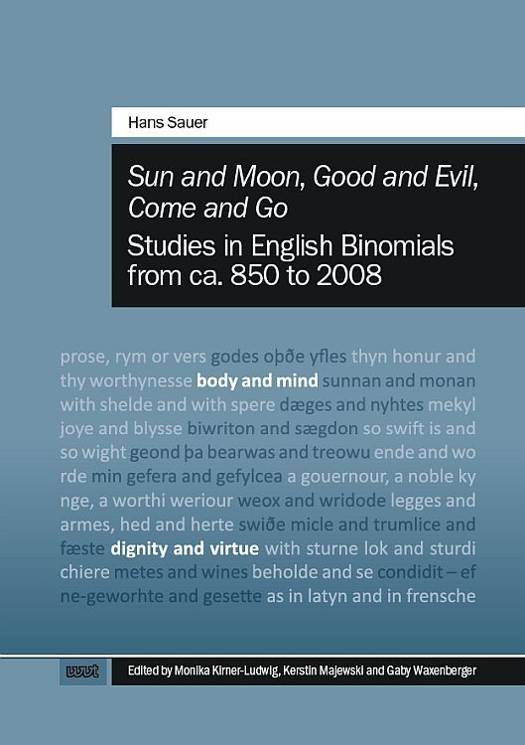
- Retrait gratuit dans votre magasin Club
- 7.000.000 titres dans notre catalogue
- Payer en toute sécurité
- Toujours un magasin près de chez vous
- Retrait gratuit dans votre magasin Club
- 7.000.0000 titres dans notre catalogue
- Payer en toute sécurité
- Toujours un magasin près de chez vous
"Sun and Moon", "Good and Evil", "Come and Go": Studies in English Binomials from ca. 850 to 2008
Hans Sauer
Livre | Anglais
47,45 €
+ 94 points
Description
The essays collected in this volume represent a selection of publications on binomials and multinomials by Hans Sauer (1946-2022), professor emeritus of English Philology at the University of Munich. The book begins with a comprehensive survey of binomials in the history of English. In each essay, these constructions are then classified according to form and function, etymology, and semantic structure. The volume concludes with a summary of Hans Sauer's main assumptions and insights. His corpus comprises medieval English historiographical, religious, and scientific texts such as The Wise Book of Philosophy and Astronomy, The Historye of the Patriarks, or Pecock's Donet, but also literary works like Gower's Confessio Amantis, Lydgate's Troy Book, and Richard Coer de Lyon. Hans Sauer's work also deals with binomials and multinomials in various translations, e.g., Aldred's glosses to the Lindisfarne Gospels, the Old English versions of Alexander's Letter to Aristotle and Theodulfi Capitula, translations commonly attributed to King Alfred's circle, Caxton's Ovid, and Hoccleve's translation of Christine de Pizan's Epistre au dieu d'amours. In addition, he discusses a Middle English and an Early Modern English translation of Boccaccio's De mulieribus claris as well as two Modern English translations of an early Chinese version of the Lotus Sutra. Hans Sauer's extensive research on binomials showcases their importance as complex linguistic and stylistic phenomena featuring in a wide range of literary and non-literary texts from the early Middle Ages until today.
CONTENTS
Personal Preface by Gabriele Sauer ix
Preface by the Editors xi
Abbreviations and Signs xiii
Acknowledgements xv
Introduction 1
i) Heaven and Earth, Good and Bad, Answered and Said: A Survey of English Binomials and Multinomials 6
ii) Binomials in the Old English Translation of Alexander's Letter to Aristotle 36
iii) Binomials in Three Alfredian Texts (Old English Dialogues, Old English Soliloquies, Old English Bede): Structure, Function, and Lexicographical (Non-)Treatment 73
iv) Aldred's Combinations with efne, eft and ymb: Their Status (Word-Formation, Glossing Device, or Both) and their Treatment in Dictionaries 93
v) Binomials in Translated Old English Prose: The Theodulfi Capitula 115
vi) The Middle English Romance Richard Coer de Lyon and its Use of Binomials 150
vii) Syntax and Beyond: Binomials in the Apollonius Story as Told by Gower 179
viii) Medieval Multitasking: Hoccleve Translates Christine de Pizan and Imitates Chaucer, for Example his Binomials 195
ix) In Defence of Lydgate: Lydgate's Use of Binomials in his Troy Book 218
x) Where Caxton Translates Freely: Binomials in his Ovid 255
xi) Twin-Formulae and More in Late Middle English: The Historye of the Patriarks, Caxton's Ovid, and Pecock's Donet 279
xii) Binomials in the Middle English and Early Modern English Versions of Boccaccio's De Mulieribus Claris 297
xiii) Flexible and Formulaic: Binomials and Multinomials in the Late Middle English The Wise Book of Philosophy and Astronomy 315
xiv) The World in Two Words: Binomials in Two English Translations of the Lotus Sutra 334
CONTENTS
Personal Preface by Gabriele Sauer ix
Preface by the Editors xi
Abbreviations and Signs xiii
Acknowledgements xv
Introduction 1
i) Heaven and Earth, Good and Bad, Answered and Said: A Survey of English Binomials and Multinomials 6
ii) Binomials in the Old English Translation of Alexander's Letter to Aristotle 36
iii) Binomials in Three Alfredian Texts (Old English Dialogues, Old English Soliloquies, Old English Bede): Structure, Function, and Lexicographical (Non-)Treatment 73
iv) Aldred's Combinations with efne, eft and ymb: Their Status (Word-Formation, Glossing Device, or Both) and their Treatment in Dictionaries 93
v) Binomials in Translated Old English Prose: The Theodulfi Capitula 115
vi) The Middle English Romance Richard Coer de Lyon and its Use of Binomials 150
vii) Syntax and Beyond: Binomials in the Apollonius Story as Told by Gower 179
viii) Medieval Multitasking: Hoccleve Translates Christine de Pizan and Imitates Chaucer, for Example his Binomials 195
ix) In Defence of Lydgate: Lydgate's Use of Binomials in his Troy Book 218
x) Where Caxton Translates Freely: Binomials in his Ovid 255
xi) Twin-Formulae and More in Late Middle English: The Historye of the Patriarks, Caxton's Ovid, and Pecock's Donet 279
xii) Binomials in the Middle English and Early Modern English Versions of Boccaccio's De Mulieribus Claris 297
xiii) Flexible and Formulaic: Binomials and Multinomials in the Late Middle English The Wise Book of Philosophy and Astronomy 315
xiv) The World in Two Words: Binomials in Two English Translations of the Lotus Sutra 334
Spécifications
Parties prenantes
- Auteur(s) :
- Editeur:
Contenu
- Nombre de pages :
- 402
- Langue:
- Anglais
Caractéristiques
- EAN:
- 9783868219562
- Date de parution :
- 06-11-24
- Format:
- Livre
- Dimensions :
- 150 mm x 21 mm
- Poids :
- 641 g

Les avis
Nous publions uniquement les avis qui respectent les conditions requises. Consultez nos conditions pour les avis.






